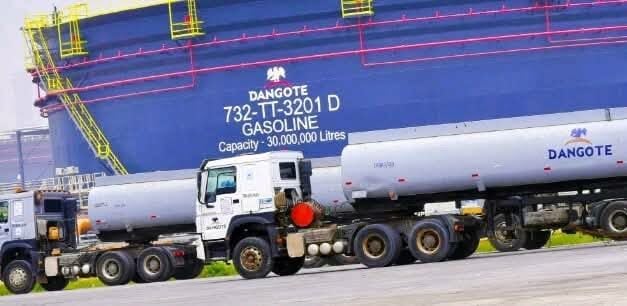Nigeria’s domestic petrol supply surged by 111% in 2025, reaching a record 3.8 billion litres in the first 10 months of 2025, driven by the ramp-up of the Dangote Refinery and other local facilities, the Nigerian Midstream and Downstream Petroleum Regulatory Authority (NMDPRA) has revealed. This is compared to the 1.8 billion litres supplied to the domestic market in 2024.
The Authority’s chief executive, Engr. Farouk Ahmed, who made this known, said the
growth in domestic supply marks a turning point in the nation’s energy landscape, signalling a significant reduction in reliance on imported fuel and a major boost to local refining capacity.
Speaking at the 2025 Energy Correspondents Association of Nigeria (ECAN) Conference in Abuja, Ahmed described the milestone as a testament to the progress made since the PIA’s implementation four years ago.
“Refined product supplies from local refineries to the domestic market have experienced drastic improvement. For example, PMS supply grew from 1.3 billion litres in 2024 to 3.8 billion litres in 2025, and the outlook is positive,” Ahmed declared.
Ahmed emphasised that the NMDPRA’s regulatory reforms have played a pivotal role in transforming the midstream and downstream oil and gas sector. “In the last 4 years, whenever I have had the opportunity to speak about our achievements and challenges at the NMDPRA, it always fills me with pride because on each occasion I can report that we are making very tangible progress at each step of the journey,” he said.
The Authority has successfully gazetted 18 regulations and developed guidelines and standard operating procedures to ensure compliance and transparency.
“We have also implemented strategies that have underscored our commitment to aligning regulatory oversight activities with national energy objectives and global best practices,” Ahmed added.
According to him, Crude supply to domestic refineries has also seen a dramatic increase, rising from about 20,000 barrels per day (bpd) in 2023 to over 40,000 bpd in 2025.
This growth, Ahmed noted, is a direct result of the NMDPRA’s implementation of the PIA provisions.
He also said the Midstream and Downstream Gas Infrastructure Fund (MDGIF) has invested over N287 billion in gas infrastructure projects, with 16 companies involved in 62 projects as of October 2025.
“The MDGIF catalysed an additional $500 million investment to Gas infrastructure by leveraging on AFRIEXIM Bank MOU to expand energy access to drive economic development,” Ahmed revealed.
The Authority has issued 23 ‘License To Establish’ for refineries since 2021, which, when fully operational, will add over 850,000 bpd to Nigeria’s existing refining capacity. “These new refineries will significantly boost our domestic refining capacity and reduce our dependence on imported products,” Ahmed stated.
Additionally, 10 gas distribution licenses have been issued for pipeline networks stretching 692km, connecting 412 customers and attracting an estimated $639.07 million in investment. “This distribution system has a multiplier effect across energy, agriculture, industry, manufacturing and socio-economic impacts,” Ahmed explained.
In its intervention, the Major Energy Marketers Association of Nigeria (MEMAN), urged the authorities to commit resources to build the technical, legal, and administrative skills needed across the new institutions and among industry partners.
Represented by Mohammed Al-Kazeem, MEMAN called for streamlining of processes and removing avoidable delays and review licensing and permit workflows with the objective of eliminating redundant steps, setting clear timelines and service level agreements, and digitising transactions where feasible.
“Ensure open access to infrastructure, enforce competition rules, guard against anti-competitive vertical integration, and make procurement and licensing processes transparent. A level playing field will lower prices, increase choice, encourage innovation, and protect consumers.
“Set clear, public metrics for success: safer operations, timely project deliveries, free and fair market outcomes, increased local content, and visible socio-economic benefits for host communities. Regular, transparent reporting will build trust and allow course correction,” MEMAN stated.
Also, the minister of State Petroleum (Gas) Ekperikpe Ekpo, stated that the gathering of media professionals, policymakers, and industry stakeholders was both timely and commendable as it also provides an essential platform to reflect on the progress made since the enactment of the PIA.
“Yet, we must also acknowledge that there are gaps that require collective efforts to address, particularly in areas of cultural and community development, energy transition, and sustainable implementation of arts provision,” Ekpo, who was represented by the Director of Gas, Ministry of Petroleum, Ruth Mela-Nunghe, said.
Earlier, the ECAN chairman, John Ofikhenua, stated that the PIA has brought structure, transparency, and renewed confidence to the oil and gas industry.
“But our work is far from done. The PIA is not a finished product; it is a living document. As technology evolves, as global energy dynamics shift, and as the world races towards cleaner and smarter energy solutions, we too must evolve,” he advised.





